Study Shows ColoWrap Increases Adenoma, SSP Detection
by Larissa Biggers, on November 09, 2018
A published study in Journal of Gastroenterology and Hepatology Research found that use of ColoWrap significantly enhanced adenoma detection in obese patients, females, and patients 60 and older. In addition, ColoWrap was associated with increased polyp and sessile serrated polyp (SSP) detection in the cecum and ascending colon across all patients in the study. These findings provide substantial additional support for the utility of ColoWrap as a tool to improve colonoscopy quality, particularly for patients at-risk for a difficult colonoscopy due to a tortuous, redundant colon or body habitus.
After adjusting for factors known to affect adenoma detection rate (ADR), researchers found that use of ColoWrap significantly increased the likelihood of adenoma detection. Specifically, adenoma detection was approximately three times more likely with ColoWrap use in obese patients and patients 60 and older. And for female patients, ColoWrap more than doubled the odds of adenoma detection.
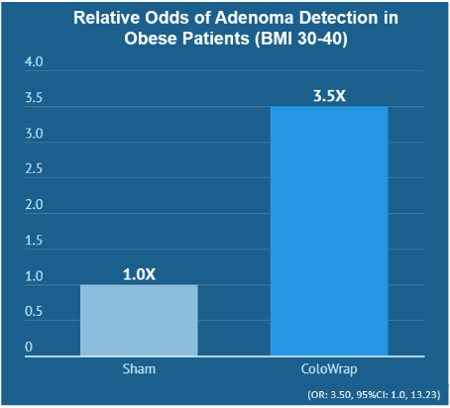
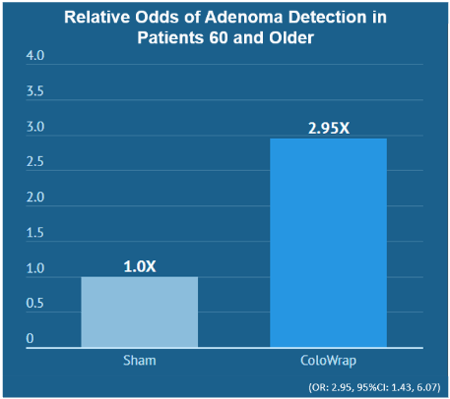
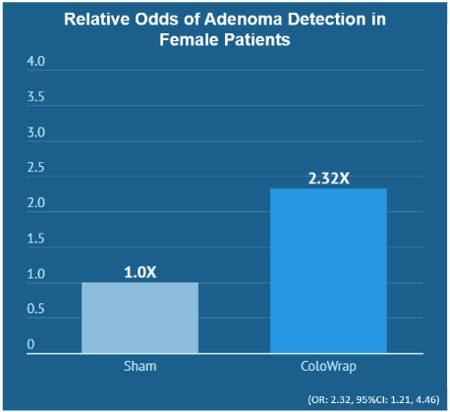
ADR within each of the three patient groups were also meaningfully increased (by approximately 33%), although these results approached, but did not reach, statistical significance due to sample size.
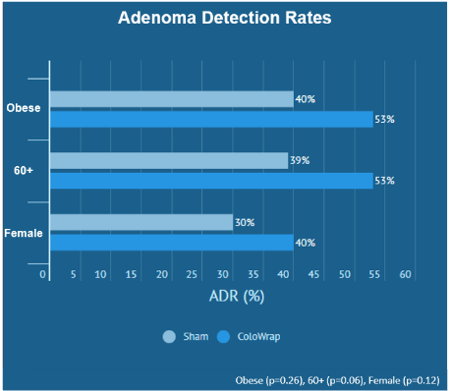
Why Adenoma Detection Matters
Finding and removing adenomatous polyps is a key component of colonoscopy for good reason--doing so reduces the risk of getting CRC and dying from CRC. ADR is a standard measurement of colonoscopy quality and reflects the percentage of patients undergoing colonoscopy who have an adenoma detected (and removed). Studies have shown that for every 1% increase in the adenoma detection rate, there is a 3% decrease in the risk of a fatal interval colorectal cancer. CRC screening tools like fecal immunochemical tests (FIT) can detect signs of colon cancer but cannot remove pre-cancerous or cancerous polyps. Only colonoscopy can do that.More Good News
As mentioned, use of ColoWrap was associated with improved polyp and SSP detection in the cecum and ascending colon for all patients. These results are noteworthy, as SSPs are likely contributors to interval cancers. (An interval cancer is a colon cancer that occurs despite a patient following colon cancer screening recommendations.) According to findings presented at the 2018 Digestive Disease Week, 15% to 20% of CRCs develop via the serrated pathway. To make matters worse, SSPs are difficult to detect during colonoscopy, which may further reason their disproportionate progression to interval CRCs. For these reasons, SSP detection rates are increasingly being reported and recognized as a stand-alone colonoscopy quality measure.
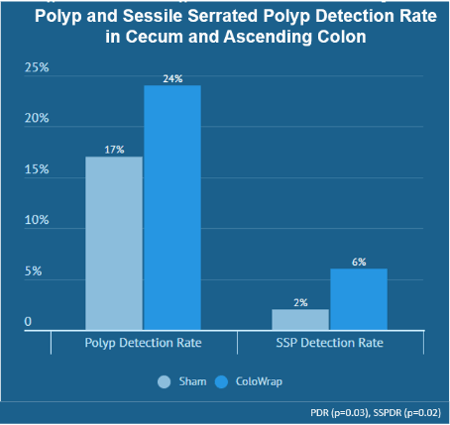
What’s Behind the Numbers?
Study authors hypothesize that the improvements in adenoma and SSP detection with ColoWrap are due to a number of factors, based on colon anatomy:
- Left colon: Better left-sided adenoma detection could be a result of the increased stability provided by ColoWrap. This “splinting” of the colon may straighten the sigmoid colon and enhance luminal distention.
- Right colon: The firm and consistent support exerted by ColoWrap may prevent the scope from "falling back" during withdrawal, a problem that is more likely to occur in patients whose insertion was difficult and prolonged due to looping. Decreased fallback increases mucosal visibility and makes detecting adenomas and SSPs easier.
What the Data Means for Physicians and Patients
ColoWrap is an abdominal compression device worn during colonoscopy. It is specifically designed to mitigate looping, allowing for easier and more effective procedures. Based on data from this study, it is reasonable to estimate that for every 1,000 ColoWraps used, at least one life will be saved, and seven people will avoid colorectal cancer. Those are numbers everyone should get excited about!


